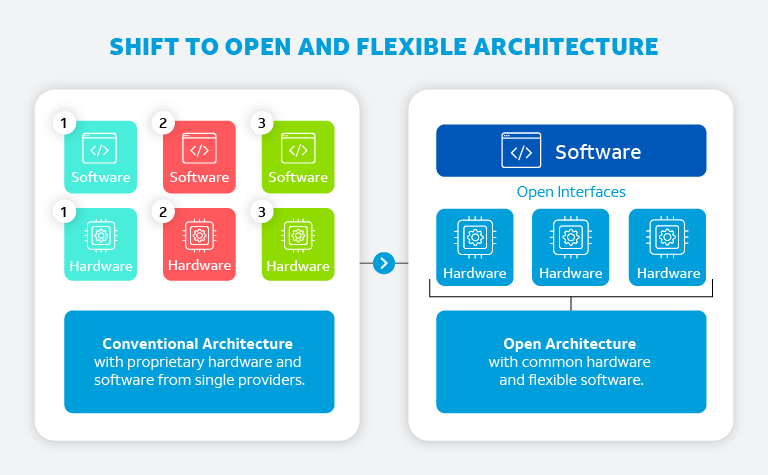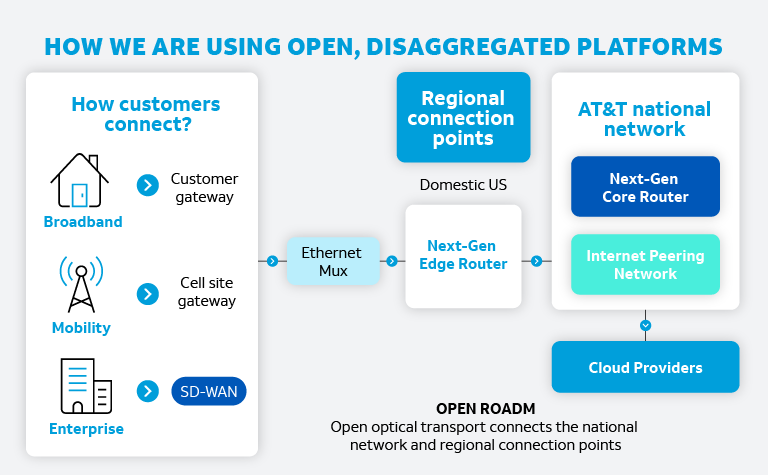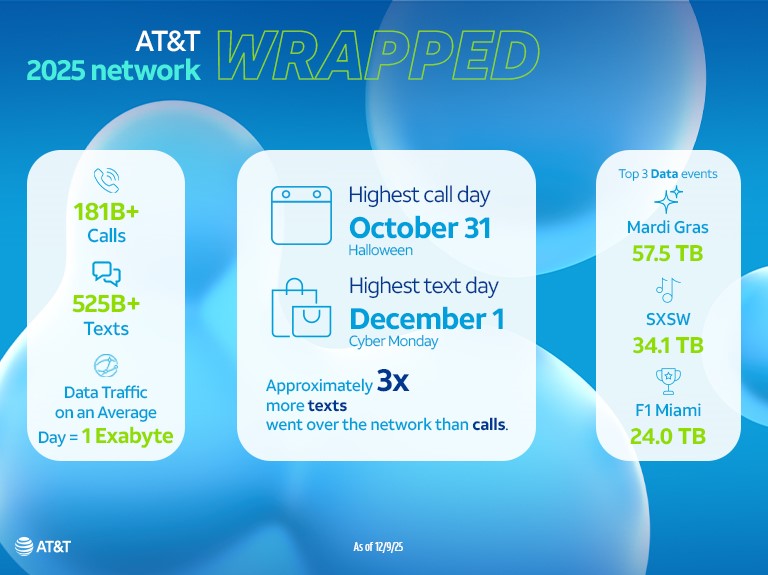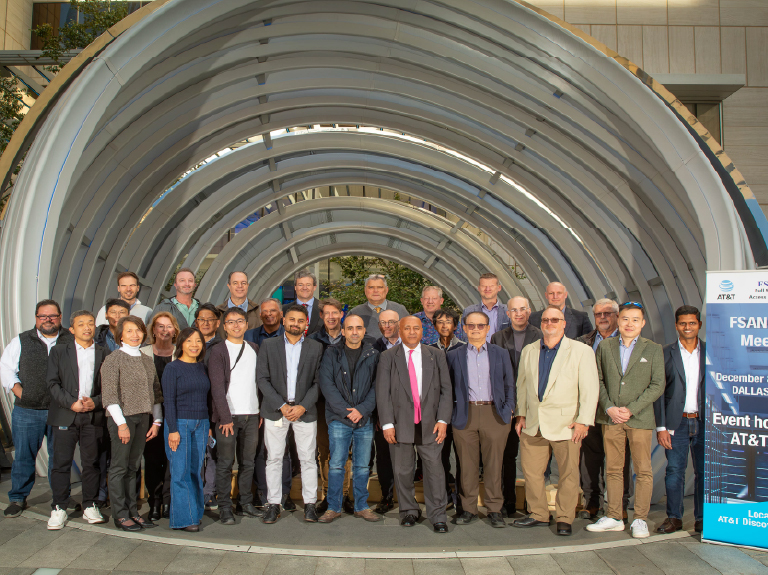2022 was pivotal for 5G rollouts and Fiber broadband expansion. And it stems from a vision and a plan to transform the network we began executing almost a decade ago to support our customers’ surging demand for connectivity.
5G – Three years after we launched 5G, it has become the fastest growing cellular generation. To put into perspective, it took 5G only 7 quarters to reach 250 million connections while 4G took 19 quarters to do the same.1 AT&T 5G now covers nearly 288 million people, and our mid-band 5G+ is covering 150 million people. AT&T 5G+ over mmWave is available in parts of more than 50 cities and nearly 70 venues.
Fiber – As of Q4 2022, AT&T Fiber has the ability to serve more than 19 million consumer locations and more than 3 million business customer locations in more than 100 U.S. metro areas, and we are on track to pass 30 million-plus consumer and business locations by the end of 2025. Early in 2022, we launched and expanded our multi-gig services to offer up to 5 Gbps symmetric speeds to consumers and businesses.
This rapid deployment is not an accident. It is all done by design.
In 2013, we published our first blueprint for the network of the future. While the smartphone revolution was still in its early stages, our engineers and developers could see that the world was about to change. Data demands would increase faster than the network could grow if we stuck with the traditional, hardware-centric approach. As 4G took off and fiber and 5G were next up, our vision was of a software-centric model that put customers first. From large enterprises to the individual consumer, they need to be confident in the network they were riding on as those connections became increasingly central to every aspect of their lives and businesses.
AT&T Labs has been central in making that vision a reality. Just like your calculator, camera and other gadgets became apps on your phone, and light bulbs, thermostats, and other devices around your house became controllable over your home network, we’re turning network hardware into software and making it accessible remotely so we can upgrade and reconfigure it securely at internet speed.
But moving control of the network from hardware to software also meant we needed to look beyond the conventional way of using proprietary, “locked” equipment from a single vendor, to instead using decoupled, “open” components that can be stacked into one switching and routing platform. We call these open platforms “white box” systems.

We unveiled our plan to develop an open white box system in 2019 that would enable us to run 10 times as much traffic.
What was vision then is here now, and we are starting to see its benefits. We announced the next-gen open disaggregated core routing and the next-gen open disaggregated IP edge routing platforms in 2020. And in 2022, our open, disaggregated program took a significant leap forward! In fact, it is meeting and, in many cases, exceeding our expectations. It has enabled us to be more efficient with our 5G and Fiber rollouts and launch high-speed broadband and 5G services to new markets much faster, as well as offer more advanced services in existing markets. Furthermore, it has minimized cost even as we manage more network traffic loads than ever before – more than 594 petabytes of global data traffic per day!
As of today, we’ve migrated more than 52% of all our production traffic to our Next-Gen Core routers, which are based on the Broadcom Jericho2, Ramon chips and uses the Distributed Dis-Aggregated Chassis (DDC) design powered by DriveNets Network Cloud DNOS software. We are now exploring a path to scale the system to 500Tb/s and then to 900Tb/s using next-gen chipset.

Here’s a progress update on our other open, disaggregated platforms:
- Next-Gen Edge Router – This platform provides our enterprise services, Ethernet, Broadband, Mobility, and Internet Gateway using Broadcom, Cisco, and UfiSpace hardware. We’ve now deployed it in AT&T production Internet peering network.
- Cell Site Gateway Router – This supports up to 100Gbps Mobility transport to provide the bandwidth demands that come with 5G services. This solution uses hardware from UfiSpace, Broadcom Qumran-AX chips, coupled with the Vyatta NOS software from Ciena. This has been deployed in AT&T’s mobility network.
- Ethernet Mux – This enables aggregation of 1 and 10 Gig access ports to 100 Gig transport. This platform is based on Broadcom’s Qumran-MX chips and uses EdgeCore hardware with Ciena’s SAOS Network Operating System software. This is now live on our Metro Ethernet and fiber footprint.
- Universal CPE – This broadband customer premise equipment today now provides high speed Dedicated Internet and Enterprise SD-WAN services. It uses Intel, Broadcom, Marvell and Silicom to put together a cost-effective and feature-rich device using Vyatta NOS software from Ciena.
- Open ROADM - Open ROADM provides the high speed and high-capacity optical transport supporting our fiber-based broadband and 5G backhaul. We have Open ROADM compliant components developed from Ciena, Cisco, Fujitsu, Infinera, and Nokia and have installed over 75+ nodes and turned up 100G and 400G wavelengths in our production network.
These great achievements are a collaborative effort. We recently hosted a “Carrier Day Summit” where global service providers and industry leaders gathered to share best practices, see what’s on the horizon for the technology and how we can further fast-track innovation to bring new products and services to the market much quicker. We are continuing to develop the open and disaggregated ecosystem to enable more advanced management capabilities and additional use cases. The task now is to unlock its full potential and make its capabilities more consumable and flexible for our customers.
Our customers’ demand for connectivity isn’t slowing down, and neither are we.
HTML Editor Component
*Contents may not have visible height
Read more Technology & Innovation news



